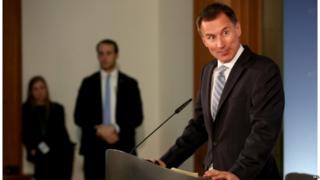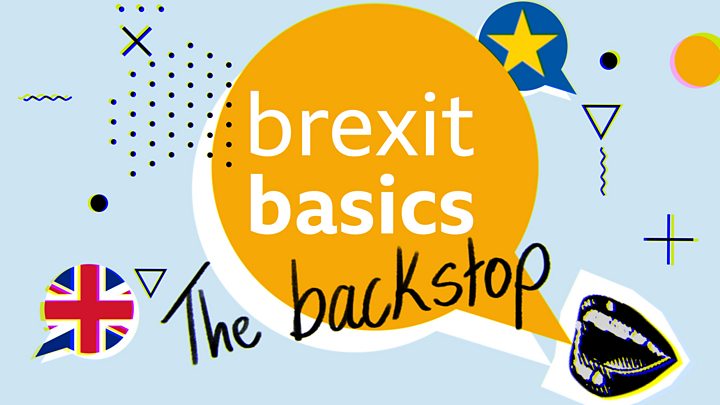 Image copyright
EPA
Image copyright
EPA
MPs can be persuaded to back the Brexit agreement if there is a "small but important" change to the terms of the Irish backstop, Jeremy Hunt has said.
The foreign secretary said MPs needed to hear that the government's legal advice about the UK's future customs arrangements with the EU had changed.
In talks later, Theresa May will seek binding guarantees that the UK won't be stuck indefinitely in a customs union.
Mr Hunt said the greatest threat to Brexit was "defeatism" over a deal.
Speaking after talks with his German counterpart in Berlin, Mr Hunt said it would be a "disaster" for both sides if the UK left the EU without a negotiated agreement on 29 March.
But he said the risk of "paralysis" in the process was equally damaging to business.
The prime minister is trying to renegotiate the backstop - the insurance policy to prevent the return of physical checks on the border between Northern Ireland and the Republic of Ireland.
It is the most contentious part of the withdrawal agreement Mrs May agreed with the EU in November, which was rejected by Parliament by a large margin last month.
Critics fear the backstop, which could be activated if the two sides do not settle their future partnership by the end of 2020 and chose not to extend the transition period, would leave the UK tied to a customs union with the EU indefinitely and see Northern Ireland treated differently from the rest of the UK.
'Flesh on bones'
Amid speculation that Mrs May could put the deal to Parliament again as soon as next week, Mr Hunt said the role of Attorney General Geoffrey Cox would be vital in the unfolding process.
Mr Cox, who will also be in Brussels for talks later this week, told MPs in December that although the agreement stipulated the backstop would be temporary and only apply until the two sides settled their future relationship, there was no way for the UK to leave it without the approval of EU member states.
MPs gave their backing for Mrs May to renegotiate the policy in a vote earlier this month although many remain unconvinced that the EU can be forced to change its position.
But Mr Hunt said the government was confident, on the basis of discussions with Conservatives and some Labour MPs, that if the issue was resolved then the deal would pass.

"The critical thing is that Geoffrey Cox needs to be able to change his advice to Parliament," he said.
"The current text uses the word temporary to describe the backstop, so what we need to do is put some flesh on the bone of what temporary actually means," he said.
"I think...with political will and conviction we can find a way to solve that problem."
The EU has consistently refused to make changes to the withdrawal agreement but has not ruled out attaching an addendum with similar legal force.
Downing Street said it expected the prime minister and Mr Juncker to have detailed discussions about the shape of any new text - dubbed the "Cox codicil" - that would satisfy MPs.
But it has played down talk that any revised text could be signed off by EU leaders at a summit in the Egyptian resort of Sharm-el-Sheikh this weekend.